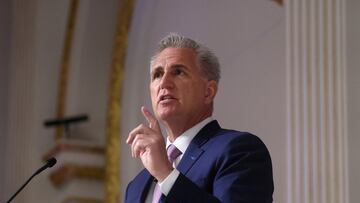How could House GOP debt ceiling plan affect student loan debt forgiveness?
Republicans presented a spending proposal to secure their votes for raising the debt ceiling. Biden’s plans for student debt relief on the chopping block.

Republicans have presented a proposal to reduce spending in order to secure their votes to raise the debt ceiling by $1.5 trillion. The 320-page plan dubbed ‘Limit, Save, Grow, Act of 2023′ would cut spending by $4.5 trillion over the next ten years.
Both sides need to reach an agreement before the US crosses the ‘X Date’, when the US would no longer be able to meet its financial obligations, which is expected to be hit by June 2023. The increase proposed by the GOP would keep the federal government in good financial standing until perhaps March 2024.
Among the features of the proposal, it would block the Biden administration’s plans to provide up to $20,000 in student debt forgiveness. Furthermore, it would hamstring the Department of Education’s ability plans to provide relief through other policies and take actions further actions.
You might be interested in: How to alleviate your student loan debt if the Supreme Court overturns Biden’s forgiveness plan
Speaker McCarthy’s debt ceiling proposal tells us everything we need to know about what he & his allies value—tax cuts for the super-rich, special interests, and big corporations over supporting the 40 million+ working Americans who are eligible for student debt relief.
— Secretary Miguel Cardona (@SecCardona) April 20, 2023
How could House GOP debt ceiling plan affect student loan forgiveness?
The GOP proposal, presented on the floor of Congress on Wednesday by Republican Speaker of the House Kevin McCarthy, would cancel President Biden’s signature student debt forgiveness plan. The program was launched in October but was quickly put on hold after several lawsuits challenged the president’s authority for the sweeping cancellation of up to $20,000 in federal student loan debt. The Supreme Court heard oral arguments at the end of February but a decision isn’t expected until perhaps June.
It would also put an end to the student loan moratorium, that has paused repayments and interest accruing, which has been in place since March 2020. It was most recently extended by President Biden in November while the administration awaited a decision from the Supreme Court. It is due to expire now at the end of June or after the Justices make a ruling, and payments would start up again 60 days after whichever comes first.
'The Limit, Save, Grow, Act of 2023’: Kevin McCarthy revealed a plan to raise the US debt ceiling by $1.5 trillion and cut federal spending by three times that amount https://t.co/PNA5biHafH pic.twitter.com/IUlunlS39j
— Reuters (@Reuters) April 20, 2023
House GOP debt ceiling plan would hamstring the Department of Education
Related stories
Not only do Republicans want to stop the White House’s broad proposal at forgiving student loan debt, it would also stop the Department of Education from moving forward with more targeted programs. The agency released new rules to help speed up federal student debt cancellations through modifications to the income-driven repayment plans. The administration’s proposal would cut payments in half, stop interest from accruing and reduce the amount of time until a debt is cancelled to ten years’ worth of payments.
Additionally, the legislation put forth by the GOP would tie the hands of the Department of Education from taking further actions. The agency would be blocked from issuing regulations or executive actions that would increase long-term costs for the government of operating the federal student loan programs.


